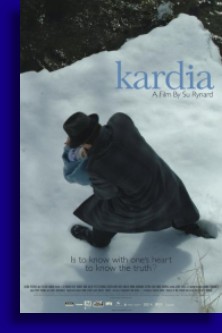

Reviewed by
Christopher Armstead


‘Kardia’ represents a bit of a return to normalcy for me, as this is more along the lines of what I expect from films coming out of the Great White North. Quiet, slow moving, contemplative, bare, cold, and cures insomnia. This string was interrupted by the pair of ‘Decoys’ flicks that only had the cold in common with the those previously seen state sponsored flicks – oh, and ‘Decoys’ also tosses in unwatchable crap into the mix. Even Canadian ‘horror’ films like the ‘Ginger Snaps’ series are relatively slow and contemplative for the genre they represent, but there are few movies that I have seen that are as slow and as contemplative as Canadian artists Su Rynard’s ‘Kardia’. However, as slow as this pic may move, it still manages to involve you into its storyline.
Mimi Kuzyk plays Hope, a Doctor of Pathology who appears obsessed with studying the heart and the secrets it holds outside of simply distributing oxygen throughout our body. In the very first scene, Hope, while narrating for us, collapses from a heart attack which leads us to her tale. As a baby she was found abandoned in the snow by a man who would become her father (Peter Stebbings). In between the scenes of Hope as a child are scenes of Hope the pathologist preparing for a lecture with the assistance of her administrative assistant Sally (Kristin Booth) and her graduate assistant Sanjay (Stephen Lobo) who are struggling with personal affairs of the heart.
Hope, the baby, was born with a rare heart defect that she cannot survive long with and is in need of a new experimental surgery, at least in the 1950’s, that could save her life. The surgery needs an adult donor and without a thought her adoptive father volunteers for the highly risky procedure despite the apparent risk to himself. Years



later we would see the adolescent Hope looking out the window waiting for her father, a former WWII fighter pilot whose eyes were badly damaged in the war, to come home where he would he read her stories, take her for walks, teach her about airplanes and most importantly just be a friend. The adult Hope, for whatever reason, has a sudden desire for information about her surgery, her father and what he did for her, causing her to question her childhood memories as real or imagined. Then of course we know from the opening scene that eventually she’s going to fall out real soon, so she better get to investigating like quick.
Look, if you were to watch the first twenty or thirty minutes of ‘Kardia’ and determine that you simply couldn’t take it any more and decided to shut it off, I would completely understand. This film starts out so slow and so methodical that if it were a dog you would hold a mirror under its nose in the hopes of seeing some kind of mist. But if you give it some time the characters in this film will start to grown on you, particularly child actress Ariel Waller who plays the young Hope, and somehow manages to fill her character with such wonder and charm, all behind a very sad pair of eyes, that she just grabs at your heart. That is if you have one dammit! Combine young Miss Waller’s soulful performance with that of Peter Stebbings inspired take as the shy introverted man with the failing eyes who has taken this abandoned child into his home and ultimately into his heart, and you have a film which is half outstanding.
The other half isn’t so however. I understand what the young lovers and their little tumble of hearts represents, but their story was glossed over and neither character was given much background or history which limited the viewer’s ability to give a damn about either of them. Mimi Kuzyk’s adult version of Hope didn’t have much more to contribute than our star crossed lovers did, and despite her constant narration about the heart and the different meanings of the heart, we know next to nothing about her as well. I’m not quite sure why at this point in time she needs to know about her father or the surgery that saved her life or why she became a pathologist or her personal life, since she spent every single waking moment at the hospital, and of course knowing she’s about to drop means we aren’t going to know.
With the care Rynard took in crafting the scenes in the past, with the detail given in regards to the surgery, the hospital, the hospital staff, in addition to the father and daughter, this film would have been better served simply staying in that time, eliminating the star-crossed lovers and only coming back to the present to introduce the story and possibly close the movie out. Slow moving, yes, but very affecting, ‘Kardia’ is one half a hell of a movie and one half of something that probably should been left on the cutting room floor.

